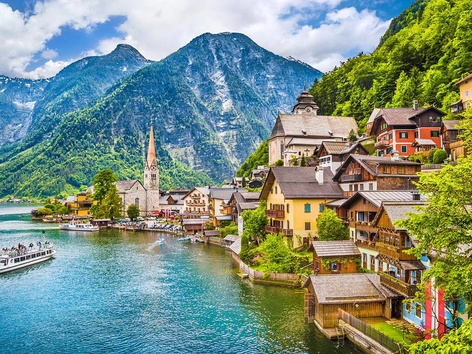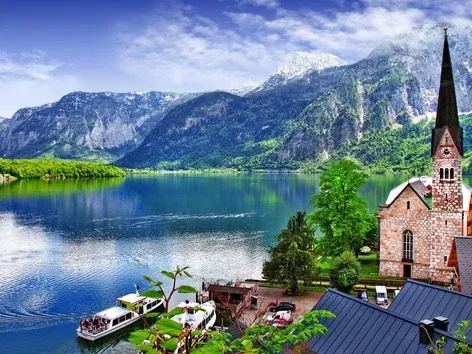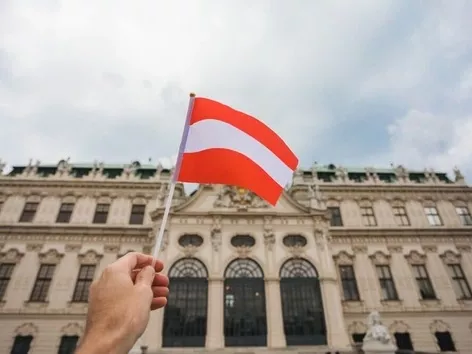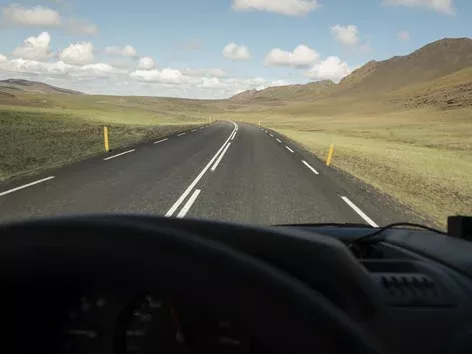Austria for Ukrainians 2024: entry rules, where to look for housing and work, and how to get financial assistance
- Rules for entering Austria in 2024
- Temporary protection in Austria for Ukrainians
- Ukrainians in Austria: how to find accommodation?
- Financial assistance for Ukrainians in Austria
- Medical services in Austria
- Education for Ukrainian children in Austria
- Where can I find a job in Austria?
- Information for Ukrainian drivers in Austria

Austria has hosted around a hundred thousand Ukrainian refugees on its territory since the beginning of the war in Ukraine. To this day, the country provides assistance to Ukrainian citizens in accommodation, food and financial aid. Find out what you need to enter Austria, what are the conditions and payments
Austria, like other European Union countries, has introduced simplified conditions for applying for asylum for Ukrainians amid Russia's full-scale invasion of Ukraine. We have collected information on the rules for moving to Austria and social support in this article.
You can find out in which EU countries you can get re-assigned protection in 2024 and when Ukrainian citizens can be deported from the EU by following the links.
You can find out about convenient routes and how to get from Austria to Ukraine in 2024here.
Rules for entering Austria in 2024
Entry without a biometric passport is allowed, but only for Ukrainian citizens fleeing for war. This rule does not apply to travellers. If your passport is about to expire or you are travelling with a child without a passport, please contact the Embassy of Ukraine in Austria (1180 Wien, Naaffgasse 23).
Ukrainians who come to Austria can stay in the country without a visa for up to 90 days. For a longer stay and social support, as in other EU countries, it is necessary to apply for temporary protection status in Austria.
It is possible to apply for refugee status in Austria, but it is subject to a number of restrictions: you need to hand over your personal documents, which means that you cannot return home or find a job for a long time to complete the paperwork.
Temporary protection in Austria for Ukrainians
Austria has extended the temporary protection status for Ukrainian citizens until 4 March 2026. Persons who are already registered in Austria and have an ‘Ausweis für Vertriebene’ document will be automatically sent a new identification document by post to the registered address. If your contact details have changed, you will need to update your residence registration (Meldezettel).
To obtain temporary protection status, contact the police registration offices. The addresses of the relevant municipal offices are available here.
Your right of residence will be confirmed by an identity card for displaced persons (Blue Card). It will be sent by post to the address of registration.
With this status, you can travel to EU countries for up to 90 days and also travel to Ukraine for a short time without losing your right to reside in Austria. If you plan to return to Ukraine permanently, you need to go through the procedure of deregistration at the institution where you applied for protection.
Ukrainians in Austria: how to find accommodation?
Upon arrival, you will be placed in temporary accommodation and provided with food and health insurance. You can find more information here.
Austria provides Ukrainians with free long-term accommodation located throughout the country. You cannot choose a region. The type of accommodation varies, but you will not have to share a room with other people. If you want to live with relatives, let the staff know and they will try to arrange shared accommodation or place you nearby.
Austrians also accommodate Ukrainians in their own homes. To find one, contact:
- Federal Agency for Care and Support (BBU);
Ukrainians can rent a home on their own, while retaining basic care and food benefits. It is also possible to apply for a rental subsidy. The rental subsidy for a family (2 persons or more) is up to EUR 300.00 per person per month.
The majority of refugees live in private housing, while state institutions provide about 15,000 places. For assistance with housing, you can also apply to an EU-supported programme such as Safe Homes, which offers funding for private individuals willing to host refugees.
There are several online platforms for finding an apartment: willhaben.at and immobilienscout24.at.
Financial assistance for Ukrainians in Austria
If you are accommodated in organised accommodation, you will be covered for all living expenses, provided with food or money for it. As part of the support, you are entitled to a clothing allowance of EUR 150,00 per person per year.
For those living in a private house, in addition to the subsidy for accommodation, you can receive financial support. For adults - up to 260 euros, for minors - up to 145 euros per person per month.
If you have a child with special needs (at least 50% disability), an additional amount of €155.90 per child per month is paid.
For a successful move and avoidance of troubles, it is worth contacting specialists. Thelawyers of Visit Ukraine provide full support and advice on visa and migration issues to successfully resolve any nuances.
Medical services in Austria
Ukrainians who have been granted temporary protection in Austria have the right to access medical services: to receive medical advice and free medicines. Registration is carried out when applying for social services. After registration, you will be assigned an insurance number.
If you are planning a trip abroad, you should take care of your insurance policy, as it is a guarantee of your safety and peaceful stay outside Ukraine. Visit Ukraine recommends taking out reliable health insurance in advance to avoid any troubles abroad and to be calm for yourself and your loved ones.
Education for Ukrainian children in Austria
Children who come to Austria with their parents have the right to attend educational institutions.
Information on kindergarten registration is available from the municipality in which you live (e.g. MA10 in Vienna). For information on school placement, please contact the education authority's counselling centre.
The school year in Austria starts on 1 September. Children start school at the age of 6 and study for 9 school years.
Austrian law requires foreigners entering the country to have an insurance policy. However, depending on the purpose of the trip and the length of stay, there are different requirements for insurance. You can learn moreabout insurance for travelling to Austria here.
Where can I find a job in Austria?
Once you have obtained an IDP card (Blue Card), you will have access to the Austrian labour market. Registration and job search is carried out through the Austrian Public Employment Service (AMS). The Centre will collect your data, such as education, professional experience and skills, as well as other personal information and offer you a job offer. If you find a job on your own, your employer can also apply to the AMS for a work permit.
You can look for a job on your own on the platforms: karriere.at andjooble.
Don't want to miss important updates and useful materials? Subscribe to our weekly newsletter!
Work in Austria for Ukrainians: recent changes in legislation
The Austrian Federal Council has introduced significant changes to the law on the employment of foreigners, opening up new opportunities for Ukrainian immigrants. The key innovation was the possibility of obtaining an RWR+ (Red, White and Red Card Plus), a document that grants full rights to reside and work in the country without sectoral or territorial restrictions.
RWR+ card holders receive a wide range of opportunities: unlimited access to the labour market, the right to reside in the status of a displaced person, the possibility of family reunification and the prospect of obtaining a permanent residence permit in the EU after 5 years.
To successfully apply for the card, you must meet the following requirements
- at least 12 months of official employment in Austria in the last 2 years;
- a full insurance package and stable employment;
- a valid passport and a Blue Card;
- sufficient income: from EUR 1,218 for single persons, from EUR 1,921 for couples, plus EUR 188 for each child.
The issuance of RWR+ cards began on 1 October 2024. Additional requirements include a Deutsch A1 certificate or a university degree and proof of accommodation.
The validity period of the card varies: three years for those who have resided in the country for more than two years and fulfilled the integration requirements and one year with the possibility of extension for those who have been in Austria for less than two years.
Important to note! Although RWR+ excludes the possibility of receiving social assistance, Blue Card holders retain their current status. The period of stay under the temporary protection programme is counted towards the period of permanent residence and citizenship.
Despite the recent changes, Ukrainians living in Austria face numerous difficulties in finding employment.
Find out what obstacles affect the search for work in Austria and how many refugees have been successfully employed here.
Information for Ukrainian drivers in Austria
Ukrainians planning to arrive in Austria by car should familiarise themselves with all the rules and requirements in advance.
You can find out more about traffic rules, driving rules, toll roads, necessary documents in Austria and everything else you need to know here.
Keep in mind that a Green Card is a prerequisite for legal driving in Austria . On the Visit Ukraine portal, you can apply for a Green Card online from a licensed insurer. Packages are available for different periods from 15 days to 1 year for cars and trucks, trailers and semi-trailers for trucks, as well as motorcycles and scooters.
Remember. When planning a trip to Austria by your own car, you need to choose a convenient route in advance and get acquainted with the rules for drivers in the country. Read more about how to get to Austria by car from Ukraine, the necessary documents, convenient routes and the main provisions of the traffic code here.
Want to know more? Read the latest news and useful materials about Ukraine and the world in the News section.
Our recommendation for a safe and comfortable trip:
Visit Ukraine Insurance - insurance for a safe stay abroad without unnecessary expenses;
Green Card - compulsory car insurance for traveling abroad;
Visit Ukraine Tickets - book tickets for buses, trains, and airplanes to/from Ukraine and between cities around the world;
Private Lawyer service - professional legal support on visa and migration issues;
Visit Ukraine Merch - buy patriotic clothing and accessories with worldwide delivery.
© 2018-2024, Visit Ukraine. Use, copying or reprinting of materials on this site is permitted only with a link (hyperlink for online publications) to Visit Ukraine.
All rights reserved.
Recommended articles
2 min
Insurance
Austrian law requires foreigners entering the country to have an insurance policy. At the same time, depending on the purpose of the trip and the length of stay, different requirements are put forward to the insurance. Find out in which cases and what type of insurance is required to enter Austria
16 Mar. 2025
More details2 min
For refugees
The Austrian parliament has passed a law granting Ukrainian refugees unlimited access to the labor market. Find out what conditions need to be met to obtain a residence and work permit in Austria, as well as when you can switch to RWR+
19 Aug. 2024
More details2 min
How to get there?
When planning a trip to Austria by car, it is necessary to choose a convenient route in advance and get acquainted with the rules for drivers in the country. Find out more about the necessary documents, convenient routes and the main provisions of the traffic code in Austria
12 Aug. 2024
More details2 min
Work
Ukrainians living in Austria face numerous difficulties in finding employment. The simplified access to the labor market, while simplifying the situation, does not solve all the problems. Find out what obstacles affect job search and how many refugees have been successfully employed so far
04 Sep. 2024
More details

